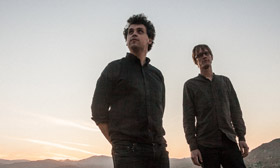
almost empty
Activision; PlayStation 3/PlayStation 4/Xbox 360,/Xbox One; £50/$59.99; 16+
Since the first vague details were leaked onto the web three years ago, people have been struggling to describe Destiny. With its constant action and grand space opera narrative, it is definitely a science fiction shooter. But, players also start with a basic character, which they then customise and upgrade with new weapons, armour and items, so it is definitely a role-playing adventure. And then it is a massively multiplayer online game too, because wherever you go in Destiny – and you can go to Earth, the Moon, Venus, Mars and elsewhere in the solar system – you bump into other players having their own adventures.
Merging these three different genres into one cohesive experience is a technical achievement that is beyond compare in the current industry. It is magnificently impressive. If you like, you can play through Destiny’s story missions alone, digging deeper into its tale of humanity making contact with alien forces and largely regretting it. Or you can team up with friends, or strangers you meet on the way, and try those missions together.
Alternatively, you can opt to go on patrols, freely exploring each planet – mostly to get into more tussles and to search for hidden loot. If you want to fight other people, there is the Crucible, a selection of traditional competitive multiplayer shoot-em-up modes. Everything you do earns experience points which levels up your character, opening new skills and luscious consumables.
It all works beautifully. It’s easy to find people, easy to start escapades. Recent multiplayer titles like Battlefield 4 and Grand Theft Auto Online have been beset by technical difficulties, but Destiny functions smoothly with only the odd server drop-out.
And, oh wow, it is beautiful. The colony ships looming above the rusted cars and wrecked cosmodrome of Old Russia; the craggy mountains of the moon, seemingly piercing the starry infinity above them; the abandoned cities of Venus, lost amid weird alien flora. The presentation, the attention to detail, from fictitious technologies to corporate logos, is superlative.
And yet… there is something missing at the heart of it all. The story, set hundreds of years in the future, doesn’t help. You are a Guardian (good name that) zooming around the solar system piecing together the origins of the Traveler, a giant alien moon thing that once befriended humanity and helped us into an era of technological advance, before being beaten unconscious by some sort of space evil. You’ve got to wake it up and save Earth, and you are aided by a flying robot with the voice of Game of Thrones star Peter Dinklage.
It sounds bloated and ridiculous and it is. But there is no sense of irony or fun in this universe – its narrative, its emotional throughline, is as cold as the hull of a spacecraft. Bungie, the developer of the game, and the team responsible for the epic Halo series of shooters, has clearly done a lot of research to build its fiction - the Destiny world is a rich amalgam of myths and fantasy tropes; the alien races that you fight – the Fallen, the Hive, the Vex – all have military hierarchies and back stories inspired by Tolkien, Asimov and a dozen other genre writers, as well as Roman and Medieval history.
These extraterrestrial tribes are varied and sometimes challenging – but the AI is largely predictable so behaviours can quickly be learned and exploited. If you have a decent sniper on your fire team, and build up a couple of titans with strong armour and upper-level rocket launchers, you’re in control. For all the narrative investment, then, you’re facing a menagerie of bullet fodder, from the lowly prancing Dregs, to the gigantic Barons and Princes who batter you with rockets and stomp about the place like heavily armoured children at a disappointing birthday party.
In short, the infrastructural brilliance hides a conservative game design ideology. Each story mission begins with some dryly intoned lore, then you run to a location, reach a choke point, shoot stuff, progress a little, new choke point, shoot stuff. Peter Dinklage decides he has to access a mainframe, so you shoot waves of monsters while he’s doing that. Then the mission is over. It is highly conventional old-school shooter level design.
Elsewhere, the Patrol quests offer some free-roaming fun, and exploring these spectacular planets is a real rush for a few hours. Then you discover that the eerie landscapes are largely empty, save for groups of regenerating baddies and some “collect-ten-of-these-things” side-quests. Unlike Grand Theft Auto V’s bustling domain, these are but cruelly beautiful theatrical sets. It is like being trapped in an interplanetary Truman Show.
That’s all fine, really it is, but it’s not new. The Last of Us shifted narrative shooters to a new level; the role-playing shooter Borderlands mixed blast-’em-up idiocy with character progression in a more daring and anarchic way. Ubisoft’s forthcoming collaborative strategy blaster Tom Clancy’s The Division is also promising to innovate on co-op play. Destiny is bigger than all of them, but somehow, the sum breaks down in the act of playing.
Make no mistake, Destiny is fun. It is stylish and technically amazing – it will provide weeks of enjoyment if you are committed to its vision. Gathering with friends to take on missions is a treat, and being joined by strangers for impromptu skirmishes leads to some lovely moments of shared drama. The Halo-esque competitive multiplayer modes are fast and exciting if not extraordinarily tactical or inventive – you can use the weapons you’ve earned in single-player but character stats are evened out so right now, it doesn’t feel unbalanced.
The progression system is nicely tuned too, so that armour, weapons and skills all interconnect allowing a true, and very holistic sense of personalisation. Certain armour items boost ammo capacity, certain skill unlocks favour strength over reflexes, so as you unlock new stuff, keeping some weapons, discarding others, you’re writing a story of your life in this universe. It’s a better story than the one you’re given.
Later, new content will be added and eventually, more players will get to experience the “end game” content with the array of complex Raid missions, familiar to veterans of massively multiplayer games.
But again we’re back to well established conventions, traditions and assurances. People say World of Warcraft only gets good after 50 hours, but this isn’t World of Warcraft, this is supposed to be the future – and many gamers won’t make it that far through this dryly earnest narrative universe; a universe that amazes us at times, but regards us with clinical abstraction.
Destiny, isn’t just set in space, it is an allegory of space. It is beautiful and fascinating, but oh so cold and immense, and the past engulfs everything.














